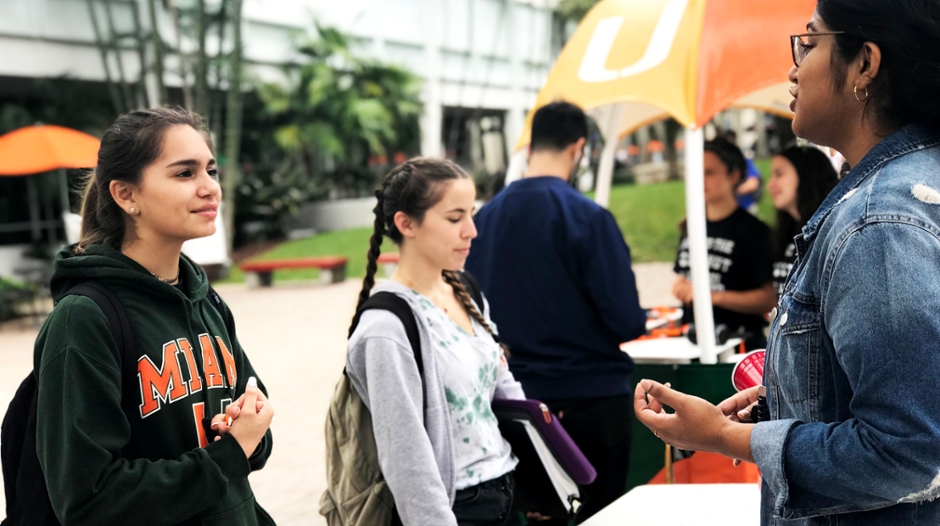A culture of health through peer-to-peer support
UM News, 02-14-2020

From a distance, they’re just another University of Miami student. Outside of the classroom, however, peer educators are engaging the campus community and bringing awareness to positive health behaviors.
Under the guidance of the Counseling Center, the Sandler Center for Alcohol and Other Drug Education, and Student Health Service, more than 40 students volunteer their time to educate their peers on topics like common mental health misconceptions, drug and alcohol abuse, and safe sex practices. As students themselves, their knowledge is all the more valuable for those looking to be connected with the right resources and for those who don’t feel quite ready to seek out professional help.
“We provide a nice middle ground,” said Julia Wilson, junior peer educator for the Counseling Outreach Peer Education (COPE) program. “If you don't want to ask a professional, reaching out to a peer educator might be a good first step for you. It can really help to hear that lots of other people feel the same way you do from someone you view to be on your level.”
Through their experiences as peer educators, these students also have the opportunity to make a difference in their own personal and professional development while making a positive impact on those around them.
“Peer education has taught me to be more open-minded,” said Carson Loperena, first-year Student Health peer educator. “I’ve learned that people have different ways of dealing with their health issues and you can’t force anyone to make a certain decision. That has made me more receptive and more aware of how to better guide people to make healthy decisions.”
In the National Peer Educator Study (NPES) that began in 2004, spanning over 200 institutions and 1,700 peer educators, it was found that 66 percent of peer educators were influenced in their decision to get involved in peer education by their desire to help others. Additionally, 33 percent reported that they thought role modeling was the most effective means to create a behavior change.
As peers have the most significant influence on one another’s growth and development in college, the results of the study suggest that peer educators are not only the most effective outreach tool for healthy behaviors on college campuses, but are also taking to heart the information they present to others by making responsible decisions themselves.
“When we seek advice, more often than not, the first person we reach out to is someone we trust,” said Whitney Platzer O’Regan, assistant dean of students and director of the Sandler Center for Alcohol and Other Drug Education. “Role modeling healthy choices within informal student spaces leads our peer educators to kick-off a snowball effect that turns into one of the most powerful and influential tools to change our campus culture.”
These peer education groups are a key part of Student Affairs' efforts to enhance student well-being and resiliency on campus. Learn more about other resources and initiatives powered by the Healthy 'Cane Network at www.miami.edu/hcn.